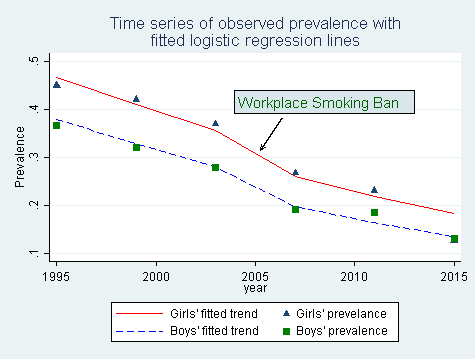Recent manuscripts
Archive
Editorial Board
Aims and Scope
Open Access
Indexing
Contact us
Authorship & COI
Principles of Transparency Checklist
Publication Ethics
Crossmark
Data Policies
Supporting Diversity
Instructions to authors (PDF)
Manuscript Types
Manuscript Formatting
How to submit
Special Publications & Reprints
Preprints
Did the Irish 2004 smokefree legislation contribute to the sharp decline in youth smoking?
1
TobaccoFree Research Institute Ireland, Ireland
Publication date: 2018-03-01
Tob. Induc. Dis. 2018;16(Suppl 1):A418
KEYWORDS
TOPICS
ABSTRACT
Background:
While the smoke-free workplaces legislation introduced in 2004 in Ireland has reduced adult smoking prevalence, its impact on youth prevalence is less clear. A particularly large reduction was observed in youth smoking prevalence between 2003 and 2007. This study sets out to assess if the smoking ban was effective in reducing youth smoking in Ireland and to see if it could explain the large fall in prevalence between 2003 and 2007.
Methods:
Data is from the European School Survey Project on Alcohol and Other Drugs (ESPAD) Ireland, which took place every four years from 1995 to 2015. A logistic regression model on grouped data was used. Dependent variable is whether a student was a smoker in last-30 day. Independent variables are time, gender and policy indicators, including workplace ban indicator and Point-of-Sale (POS) ban indicator.
Results:
Smoking prevalence among youths in Ireland has dropped from 41% in 1995 to 13% in 2015, an average annual reduction of 1.4% (95% confidence interval 1.3%-1.5%). The workplace ban had strongly significant impacts on reducing youth smoking, while the contribution of POS ban was negligible. In particular, a significantly improved fit was obtained by the model which included term for workplace ban with a 4.3% (1.2%-7.5%) reduction in prevalence, in addition to an average annual reduction of 1.1% (0.8%-1.3%).

[Prevalence and fitted regression lines]
Conclusions:
The workplace ban introduced in 2004 has significantly helped to explain the out-of-trend reduction in youth smoking prevalence, although the legislation was not particularly targeting youths. While removal of point of sale tobacco promotion was to reduce awareness of smoking among young people, its impact on prevalence was insignificant. The significance of time variable may capture the impact of other tobacco control policies implemented, particularly tax increase every year. There were no school-specific policies introduced during this period.
While the smoke-free workplaces legislation introduced in 2004 in Ireland has reduced adult smoking prevalence, its impact on youth prevalence is less clear. A particularly large reduction was observed in youth smoking prevalence between 2003 and 2007. This study sets out to assess if the smoking ban was effective in reducing youth smoking in Ireland and to see if it could explain the large fall in prevalence between 2003 and 2007.
Methods:
Data is from the European School Survey Project on Alcohol and Other Drugs (ESPAD) Ireland, which took place every four years from 1995 to 2015. A logistic regression model on grouped data was used. Dependent variable is whether a student was a smoker in last-30 day. Independent variables are time, gender and policy indicators, including workplace ban indicator and Point-of-Sale (POS) ban indicator.
Results:
Smoking prevalence among youths in Ireland has dropped from 41% in 1995 to 13% in 2015, an average annual reduction of 1.4% (95% confidence interval 1.3%-1.5%). The workplace ban had strongly significant impacts on reducing youth smoking, while the contribution of POS ban was negligible. In particular, a significantly improved fit was obtained by the model which included term for workplace ban with a 4.3% (1.2%-7.5%) reduction in prevalence, in addition to an average annual reduction of 1.1% (0.8%-1.3%).

[Prevalence and fitted regression lines]
Conclusions:
The workplace ban introduced in 2004 has significantly helped to explain the out-of-trend reduction in youth smoking prevalence, although the legislation was not particularly targeting youths. While removal of point of sale tobacco promotion was to reduce awareness of smoking among young people, its impact on prevalence was insignificant. The significance of time variable may capture the impact of other tobacco control policies implemented, particularly tax increase every year. There were no school-specific policies introduced during this period.
Share
RELATED ARTICLE
We process personal data collected when visiting the website. The function of obtaining information about users and their behavior is carried out by voluntarily entered information in forms and saving cookies in end devices. Data, including cookies, are used to provide services, improve the user experience and to analyze the traffic in accordance with the Privacy policy. Data are also collected and processed by Google Analytics tool (more).
You can change cookies settings in your browser. Restricted use of cookies in the browser configuration may affect some functionalities of the website.
You can change cookies settings in your browser. Restricted use of cookies in the browser configuration may affect some functionalities of the website.

